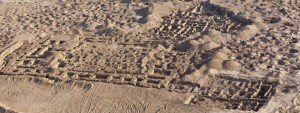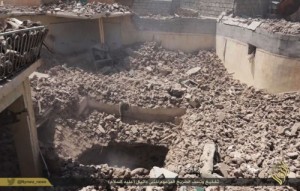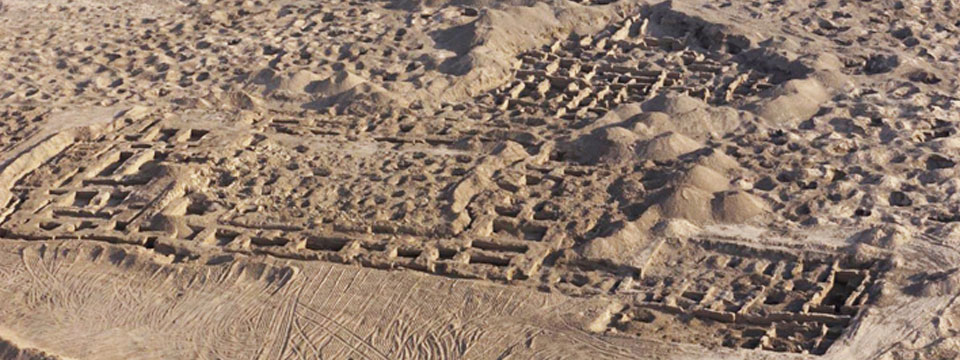Looting in the Near and Middle East
http://www.unesco.org/new/en/safeguarding-syrian-cultural-heritage/
The act of looting seems to stem from the outbreak of war, or by conflict that can cause chaos. Claims are made that the appropriation of obtaining material due to this chaos can be a viewed in a positive light as well as in a very negative one. In order to see both sides of the argument, information on the subject and actions are needed. Looting can be seen as either just an activity that is based off of naive motivation, or as an act that is based on preconceived notions. Notable acts of looting have been seen in many forms, and need to be broken down into their most primal forms to be fully understood.
Though looting is a common outcome of heated or armed conflict, it has not received much academics attention in the study of why, or the overall outcome of these acts. (MacGinty 857) The academic community views looting in three main categories. Category one; is simply the view that it is a by-product that shouldn’t be viewed as a topic worth discussing. Category two; views looting as a way to retain once lost materials, or regaining appropriately and deserved objects. Which seems to have a large gray area within this study that leave much up to individual interoperation. The third category of investigation into looting is purely a greed-based idea that seems underdeveloped such as the act itself. In order to view these three ideas as accurate, I suggest grouping all ideals together to say that looting in general should be viewed only as a negative act.
As the main focus of the Collier and Moeffler defense group suggests, viewing looting as a product of conflict is not enough to bring these acts to a halt (MacGinty 858) Which brings up the question; in which way can the act of looting and the outcome of looters actions be limited, or dealt with? To answer questions like these, it is important to view both sides of the argument. Some do believe that it is their right, or that their actions of looting are just. These are common thoughts placed upon those who show no remorse, or see no negative outcome of their actions. Sarah Parcak suggests a possible solution to these acts in her positional piece Satellite Remote Sensing Methods for Monitoring Archaeological Tells in the Middle East. She states that a protocol must be made to monitor archaeological sites and nearby active regions. By organizing a system such as this, the act of looting would be more steadfastly viewed in a negative light, which in turn could lead to the decrease in these actions. Questions may be raised upon this solution that bring up more question than it provides answers. Such as the fact that most looting occurs during militant action, or by conflict related events. The main focus of power and defense may not be able to keep an eye on sites of historical worth.

This leaves the answer to institutions that could potentially profit from the actions of looting. In order to decrease the market for items as these, the thief must not be rewarded for their action, which in turn will refrain actions as such. Collections connected to the well being of historical integrity and academic research should understand the history of the work, and how the work was discovered. By grouping together with organizations such the United Nations Educational, Scientific and Cultural Organization (UNESCO) and other that dedicate time and funds to the prevention of such acts. By building awareness, and preventing the sale of these objects, the market will diminish as well as the acts itself.

The Hunt for Looted Antiquities in the World’s Museums
To grasp the full idea of the act of looting, as well as the outcome, one needs to view the whole story. The history behind the work, the act of locating the work, and the way that the work was brought to the attention of the current market. By concentrating efforts and resources, the act of looting could be wiped clean from our vocabulary.
Works Cited
Mac Ginty, Roger. Looting in the Context of Violent Conflict: A Conceptualisation and Typology. Third World Quarterly .Vol. 25, No. 5 (2004) , pp. 857-870. Taylor & Francis, Ltd. http://www.jstor.org/stable/3993697
McCadams, Robert. Contexts of Iraqi Looting. Proceedings of the American Philosophical Society Vol. 149, No. 1 (Mar., 2005) , pp. 56-62. American Philosophical Society. http://www.jstor.org/stable/4598908
Parcak, Sarah. Satellite Remote Sensing Methods for Monitoring Archaeological Tells in the Middle East, Journal of Field Archaeology . Vol. 32, No. 1 (Spring, 2007) , pp. 65-81. Maney Publishing. http://www.jstor.org/stable/40026043
By: Brad Hahn. University of Alabama 2015
